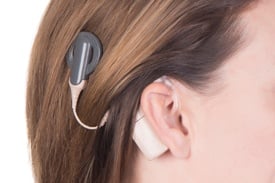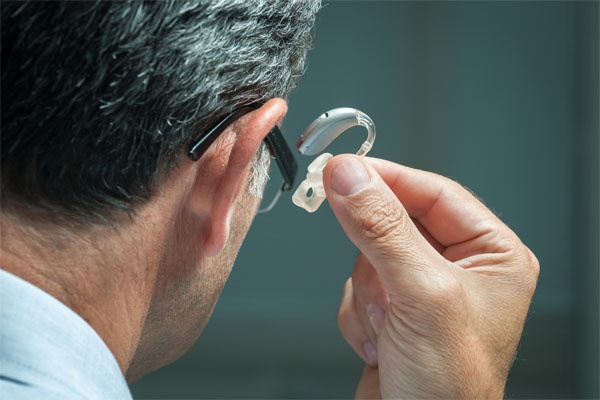When your hearing aids do not provide enough help in certain environments, or if you don’t wear hearing aids but need help hearing only in certain situations, you may want to consider an assistive or alerting device. Discuss with your audiologist which devices might be helpful to you. At CHSC, we offer a variety of devices and can you determine which is right for you.
Bridgid M. Whitford Au.D, CCC-A
Recent Posts
Assistive Listening Devices Can Boost Your Hearing
Tags: Audiology, Hearing Aids, Communication, Hearing, Hearing Loss
How Hearing Works
The outer ear is what most people consider “the ear.” It consists of a flap of skin/cartilage (called the pinna or auricle) on the outside of the head. It collects sound and directs it into the ear canal. The ear canal is a closed tube with hairs and “wax glands” in the outer portion. Our ear canal is self-cleaning. The wax glands produce wax, or cerumen, and the tiny hairs push the wax out of our ears. As the wax moves out of the ear, it cleans the ear canal and keeps unwanted critters, such as insects, out of the ear. At the end of the ear canal is the eardrum, or tympanic membrane. When air moves it creates vibrations. These sound vibrations are collected by the pinna and directed into the ear canal, to the eardrum, causing it to vibrate just like the head of a drum when you hit it with a drumstick. When an audiologist or physician looks into a healthy, unobstructed ear with an otoscope, s/he can see the outer surface of the eardrum.
Tags: Audiology, Communication, Hearing, Hearing Loss
What is Auditory Processing and How Does it Work?
Auditory processing is basically how hearing works between the ear and the brain. It consists of a specific set of skills that most of us perform without any difficulty – or awareness. These include:
What is a Cochlear Implant?
A cochlear implant is a small, surgically implanted electronic device that can help to provide access to sound to people with severe to profound hearing loss and those who cannot hear or understand speech with hearing aids. While hearing aids make sound louder, cochlear implants directly stimulate the nerve fibers in the inner ear (cochlea). An implant does not create normal hearing; instead, under the appropriate conditions, it can give a deaf individual useful auditory understanding of speech and environmental sounds.
Tags: Hearing Aid, Audiology, Hearing Aids, Hearing, Deaf, Hard of Hearing
Newborn Hearing Testing & Your Baby
As of 2004, Ohio law requires that all Ohio hospitals and birthing centers must offer the Universal Newborn Hearing Screening (UNHS) before discharge. Technology allows for hearing to be checked at any age, including newborns. The methods used are safe, quick and effective. The hearing screening determines whether a more detailed evaluation of a baby's hearing is needed. These hearing screening reports must be sent by the birthing hospital to the Ohio Department of Health (ODH).
Tags: Audiology, Hearing Aids, Hearing, Hearing Loss
Does Insurance Pay for Hearing Aids?
Cleveland Hearing & Speech Center has had a long history of serving people with communication needs regardless of their ability to pay. Our Audiology Patient Assistance (APA) Program is available to those who require hearing aids and demonstrate financial need. In addition, we are a provider for Medicaid and Medicaid Managed Care plans including CareSource. These programs are targeted to those who have limited financial resources.
However, traditionally, there has been essentially no financial support available for people who are working to pay bills and support families but for whom the cost of hearing aids could be prohibitive. Because of the high cost, many people who fall under this category would typically avoid treating theirTags: Audiology, Hearing Aids, Hearing, Support
My Baby Needs Hearing Aids – Now What?
My beautiful baby is born and the feelings of joy are immense. Everything is brand new and a little overwhelming. The routine hearing screening at the hospital is performed. Wait. What? My baby needs more testing? But that doesn’t make sense! We have no history of hearing loss in the family and my baby is "healthy.” I do as suggested and schedule a full diagnostic test. The results show a permanent hearing loss. The audiologist is recommending hearing aids.
Tags: Hearing Aid, Hearing Aids, Communication, Hearing, Hard of Hearing, Hearing Loss
How to Communicate with Your Deaf or Hard of Hearing Child
Tags: Hearing Aids, Communication, Hearing, Deaf, Hard of Hearing, Hearing Loss, American Sign Language, Interpreting, ASL
Development Success: Your Child's Team of Professionals
 As a parent, you will always want what is best for your child. At times, however, you may not be certain where to turn for help when a problem arises. Be assured - there are numerous professionals available to assist. Following is a helpful list you may refer to when determining your next steps.
As a parent, you will always want what is best for your child. At times, however, you may not be certain where to turn for help when a problem arises. Be assured - there are numerous professionals available to assist. Following is a helpful list you may refer to when determining your next steps.Tags: Support, Caregiving
What is a Hearing Communication Disorder?
A communication disorder is an impairment in the ability to receive, send, process, and comprehend concepts or verbal, nonverbal and graphic symbol systems. A communication disorder may be evident in the processes of hearing, language, and/or speech. A communication disorder may range in severity from mild to profound.
Tags: Hearing Aids, Communication, Hearing, Hard of Hearing, Hearing Loss

















